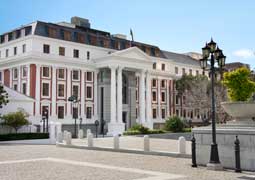
Members of Parliament held a debate on a motion proposed by the African Transformation Movement (ATM) in the National Assembly calling for “the ring-fencing of the micro-economy for the exclusive use of South Africans”.
Opening the debate, ATM MP Mr Vuyolethu Zungula argued that it was unfair that the micro-economy was dominated by non-South Africans. He suggested that the country must secure the informal economy for its citizens to create a mass-based economy to diversify sources of employment.
Mr Zungula claimed that many leading African countries have been successful in protecting their micro-economies for locals. In this way they create a space in which locals thrive, large numbers of people participate in the economy, and their gross domestic product (GDP) grows.
Many African countries’ economies are informal due to the oppressions of colonialism they were subjected to, Mr Zungula continued. Informal economies became a safe space for locals to trade and make a living. “In our country, there is a daring neglect of the township, rural and inner-city economies. The micro-economy is worth over R400 billion and it is worrying that a huge chunk of this amount is not in the hands of South Africans.
“The informal economy contributes approximately 30 percent to the South African GDP. The contribution is artificial, however, as the sector is highly dominated by non-South Africans. This is because businesses in the informal economy are not taxed and migrants do not pay any trade levies. And it’s a cash economy, meaning huge amounts of money leaving the country cannot be properly accounted for,” said Mr Zungula.
He further called on South Africa to “catch up with the rest of Africa” and develop legislation that protects the micro economy for its citizens. “There can never be justice and prosperity if locals are spectators in their own economy and migrants dominate economic activities.”
However, Ms Thozama Mantashe of the African National Congress shot down the ATM’s motion, labelling it “an antithesis of what the ANC stands for”. She said the ruling party was committed to creating inclusive economic growth, empowering historically disadvantaged people, creating employment, as well developing and integrating the African continent.
“This motion will not find expression or practicality anywhere in the world. Micro-economy is interlinked and interdependent on the macro-economy and vice versa. We have heard arguments like these, which border on xenophobia, being advanced by some narrow nationalists. Some went to the extent of suggesting that nations should build walls between neighbours. These arguments are dangerous and must be rejected by all good-thinking people of the world over,” said the MP.
The Democratic Alliance also rejected the motion, calling it “an attempt to pit people against one another based on where they come from. It is one of the vilest attempts to sow xenophobic divisions amongst people in a post-democratic South Africa. I encourage all parties in Parliament to reject outright this crass attempt to determine who should and should not be allowed to participate in our economy”, said DA MP Mr Dean Macpherson.
He said anyone who was legally in South Africa, no matter their nationality, should have a right to trade and live freely and we should make feel welcome as our brothers and sisters. “We will never allow this country to be like the apartheid government which ‘ring-fenced’ certain sectors of the economy for certain people. South Africa is a country for all who live in it and not a country for some, based on the language they speak.”
Ms Delisile Ngwenya of the Economic Freedom Fighters called for the protection of certain jobs for locals. “Our people can’t get jobs in restaurants, they cannot get jobs in salons, in hospitality sector. There is a big micro-economy around cell phones and electronic gadgets that break and are fixed all the time, but our people cannot participate in this economy because they don’t have skill or cannot even afford even the most basic tools.
“Protect certain jobs for local people. In certain areas we must emphasise that certain malls, restaurants and government contracts only certain people will be employed. We cannot continue to bring from outside more live animals and animal products when we can farm locally. Our people are doing communal farming of cows, goats, sheep and live chickens on a daily basis but are not protected and do not have access to the market,” said Ms Ngwenya.
Ms Liezl van der Merwe of the Inkatha Freedom Party said her party will table a private Members Legislation to compel companies employing low-skill or no-skill workers to prioritise the interests of South Africans. “It is time to take bold and patriotic steps in the interest of our people. It is time to put South Africans first. We want South Africans to run their own spaza shops, to have the first opportunity to access jobs in the security, hospitality, trucking, construction and other industries. We want South Africans to work.”
Sakhile Mokoena
3 March 2020

